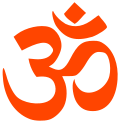
Back জীবনমুক্ত Bengali/Bangla Jivanmukta German جیوان موکتا Persian Jivanmukta French जीवन्मुक्त Hindi Dzsívanmukta Hungarian ಜೀವನ್ಮುಕ್ತ Kannada Džyvanmukta Lithuanian Jivanmukta Dutch Dźiwanmukta Polish
| Part of a series on |
| Hinduism |
|---|
 |
A jivan mukta or mukta[1] is someone who, in the Advaita Vedanta philosophy of Hinduism, has gained and assimilated self-knowledge, thus is liberated with an inner sense of freedom while living.[2][3] The state is the aim of moksha in Advaita Vedanta, Yoga and other schools of Hinduism, and it is referred to as jivanmukti (Self-realization).[4][5][6]
Jivanmukti contrasts with the concept of videhamukti; the latter means "liberation or emancipation after death, in afterlife".[7][8]
- ^ The Vivekacūḍāmaṇi of Śaṅkarācārya Bhagavatpāda: An Introduction and Translation edited by John Grimes "A mukta is a mukta, with or without a body.110 It may be said that a knower of the Self with a body is a jivanmukta and when that person sheds the body, he attains videhamukti. But this difference exists only for the onlooker, not the mukta."
- ^ Gavin Flood (1998), An Introduction to Hinduism, Cambridge University Press, ISBN 978-0521438780, page 92-93
- ^ Klaus Klostermaier, Mokṣa and Critical Theory, Philosophy East and West, Vol. 35, No. 1 (Jan., 1985), pages 61-71
- ^ Andrew Fort and Patricia Mumme (1996), Living Liberation in Hindu Thought, ISBN 978-0-7914-2706-4
- ^ Norman E. Thomas (April 1988), Liberation for Life: A Hindu Liberation Philosophy, Missiology, Volume 16, Number 2, pp 149-160
- ^ Gerhard Oberhammer (1994), La Délivrance dès cette vie: Jivanmukti, Collège de France, Publications de l'Institut de Civilisation Indienne. Série in-8°, Fasc. 61, Édition-Diffusion de Boccard (Paris), ISBN 978-2868030610, pages 1-9
- ^ M. von Brück (1986), Imitation or Identification?, Indian Theological Studies, Vol. 23, Issue 2, pages 95-105
- ^ Paul Deussen, The philosophy of the Upanishads, p. 356, at Google Books, pages 356-357
© MMXXIII Rich X Search. We shall prevail. All rights reserved. Rich X Search